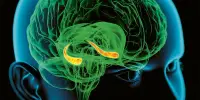According to a new study conducted by researchers at the University of California, Davis, and Northwestern University, people with conscientiousness, extraversion, and positive affect are less likely to be diagnosed with dementia than those with neuroticism and negative affect. The difference was not tied to physical brain tissue damage reported in dementia patients, but rather to how specific personality qualities help people negotiate dementia-associated difficulties.
The study was published in Alzheimer’s & Dementia: The Alzheimer’s Association Journal. Previous studies have attempted to demonstrate relationships between personality qualities and dementia, but they were largely small and limited to certain populations, according to Emorie Beck, assistant professor of psychology at UC Davis and the paper’s first author.
“We wanted to leverage new technology to synthesize these studies and test the strength and consistency of these associations,” Beck said.
We found almost no evidence for effects, except that conscientiousness’s protective effect increased with age. Dementia can be caused by a variety of circumstances. This study, among those not directly related to genetics, represents a first step in elucidating the links between personality and dementia.
Emorie Beck
If those findings hold up, she believes that targeting personality traits for change in interventions earlier in life could be a long-term method to minimize dementia risk. Beck and colleagues examined data from eight previously published studies involving approximately 44,000 patients, 1,703 of whom got dementia.
They compared clinical symptoms of dementia (performance on cognitive tests) and brain pathology at autopsy to measures of the “big five” personality traits (conscientiousness, extraversion, openness to experience, neuroticism, and agreeableness) and subjective well-being (positive and negative affect, and life satisfaction).
Personality is typically thought to be linked to dementia risk through behavior, Beck said. For example, people who score high on conscientiousness may be more likely to eat well and take care of their health, which results in better health in the long term.
The researchers found that high scores on negative traits (neuroticism, negative affect) and low scores on positive traits (conscientiousness, extraversion, positive affect) were associated with a higher risk of a dementia diagnosis. High scores on openness to experience, agreeableness, and life satisfaction had a protective effect in a smaller subset of studies.

Link to diagnosis but not pathology
To their surprise, however, no link was found between these personality traits and actual neuropathology in the brains of people after death. “This was the most surprising finding to us,” Beck said. “If personality is predictive of performance on cognitive tests but not pathology, what might be happening?”
One explanation is that some personality traits could make people more resilient to the damage caused by diseases such as Alzheimer’s. People with higher levels of some traits may find ways, whether they are aware of it or not, to cope with and work around impairments. Other work by members of the study team has shown that some people with quite extensive pathology can show little impairment on cognitive tests.
Age, gender, and educational attainment were also investigated as potential moderators of the connection between personality and dementia risk and neuropathology.
“We found almost no evidence for effects, except that conscientiousness’s protective effect increased with age,” according to Beck. Dementia can be caused by a variety of circumstances. This study, among those not directly related to genetics, represents a first step in elucidating the links between personality and dementia, according to Beck.
The researchers intend to continue and broaden their research, which will include looking at persons who have little impairment while having a lot of pathology. They also intend to investigate other everyday elements that may have a role in the development of dementia.















